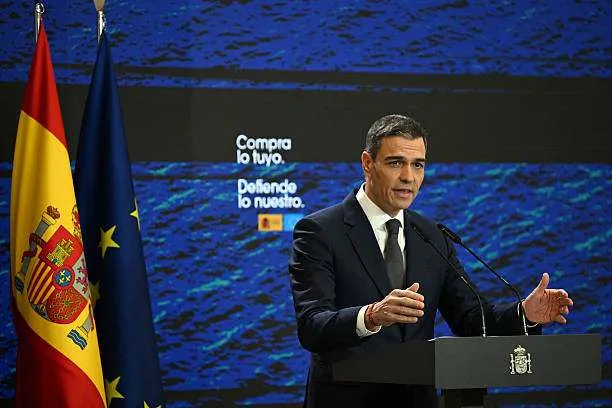Pedro Sánchez strengthens trade ties with Vietnam and China amid US tariffs
Spanish prime minister seeks new economic alliances in Asia as EU faces growing pressure from US trade policies.
 |
| Spanish Prime Minister Pedro Sanchez delivers a public statement at La Moncloa Palace in Madrid on April 3, 2025. Photo by Javier Soriano/AFP |
By Anna Fadiah and Hayu Andini
Pedro Sánchez strengthens trade ties with Vietnam and China amid US tariffs, embarking on a high-stakes diplomatic tour that underscores Spain’s efforts to reorient its trade strategies amid global market unrest. The move comes in response to President Donald Trump’s sweeping import tariffs, which have rattled the European Union and upended long-standing economic assumptions across global markets.
The Spanish prime minister is scheduled to depart for Vietnam on Tuesday, joined by his ministers of foreign affairs and agriculture. During this leg of the trip, Sánchez will engage with Vietnamese officials to deepen trade cooperation, particularly in sectors such as food exports, renewable energy, and manufacturing—areas where Spain sees substantial growth potential.
Later in the week, Sánchez will travel to China for a two-day state visit on April 10 and 11, meeting with President Xi Jinping and Premier Li Qiang. The Chinese Foreign Ministry confirmed the invitation, describing it as an opportunity to advance bilateral relations amid shared concerns about US-led protectionism.
Economic mission shaped by US policy
The visits follow a bold economic initiative announced by Sánchez last week: a 14.1 billion euro package designed to shield and modernize the Spanish economy in light of Trump’s escalating tariff regime. That stimulus plan includes targeted subsidies for exporters, modernization funds for agricultural producers, and new loan guarantees for tech-focused small businesses.
The urgency behind Sánchez’s outreach lies in the deepening rift between the United States and its traditional trading partners. Just days ago, Trump unveiled new tariffs: a 34 percent hike on Chinese imports—already burdened with a 20 percent levy earlier this year—and a 46 percent tariff on Vietnamese goods. European Union products were not spared either, with a 20 percent tariff imposed on a range of industrial and agricultural items.
The European Union has responded with concern. While formal retaliation is still under discussion, EU officials have hinted at a broader reevaluation of trade relations with China as a counterbalance to American economic pressure.
Spain turns to Asia for strategic growth
For Sánchez, the trip is more than symbolic. Vietnam and China offer access to rapidly expanding consumer markets, logistical hubs, and crucial resources for Spain’s green energy and digital infrastructure sectors. Spain also views Vietnam as a potential gateway to ASEAN markets, where Spanish businesses have limited but growing influence.
“In a time of economic uncertainty and global shifts, it’s essential that Spain builds new bridges,” Sánchez said ahead of the trip. “We must prepare for a new trade era—one defined by cooperation, resilience, and diversification.”
In Vietnam, the focus is expected to be on expanding Spanish agricultural exports and signing new cooperative agreements on sustainable development. The visit will also include a forum with Spanish and Vietnamese business leaders to explore mutual investment opportunities.
China, on the other hand, represents both a challenge and an opportunity. While bilateral trade has grown steadily, Spain is also cautious about overdependence. The meetings with Xi Jinping are expected to touch on fair trade practices, market access for Spanish companies, and joint projects under China's Belt and Road Initiative.
EU’s shifting stance in the global trade arena
Sánchez's tour comes as the European Union finds itself increasingly squeezed between two superpowers. While the US remains a vital ally, Trump's erratic economic policies have cast doubt on the stability of transatlantic trade. The EU has therefore started rethinking its commercial alliances, with Asia playing an increasingly central role.
European Commission President Ursula von der Leyen recently hinted at the need for “a more autonomous and adaptable trade strategy,” signaling that Brussels may pursue independent deals with China, India, and ASEAN countries regardless of Washington’s stance.
Spain, one of Europe’s largest economies and a major player in the Mediterranean, is poised to take a leading role in this strategic pivot. With Sánchez at the helm, the country is clearly signaling that it will not wait for EU consensus before protecting its economic interests.
Business community reacts cautiously
Spanish industry leaders have welcomed Sánchez's proactive diplomacy but remain cautious about the tangible outcomes. The Confederation of Employers and Industries of Spain (CEOE) issued a statement supporting the mission but emphasized the need for enforceable trade protections and simplified regulatory pathways for Spanish firms operating in Asia.
“Trade diplomacy must translate into real market access,” said CEOE president Antonio Garamendi. “These talks are important, but the results must be felt on the ground.”
Meanwhile, Spanish farmers, already anxious over competition from cheaper Asian imports, have expressed mixed feelings. While some hope the visit could open up new export markets, others worry about increased exposure to unfair competition.
Sánchez’s gamble in a volatile world
Pedro Sánchez strengthens trade ties at a moment when traditional economic certainties are unraveling. Globalization, once taken for granted, is now being reshaped by national interests, supply chain crises, and unpredictable geopolitical shifts.
The prime minister’s decision to pivot toward Asia reflects a broader European realization: the world’s economic center of gravity is moving eastward, and nimble diplomacy is needed to keep pace. Whether this strategy pays off remains to be seen, but it is clear that Sánchez is intent on securing a new place for Spain in a rapidly evolving trade landscape.
As tensions with the United States escalate, the prime minister’s moves could set the tone for a new era of Spanish foreign policy—one marked by independence, agility, and a more diversified set of global partnerships.
